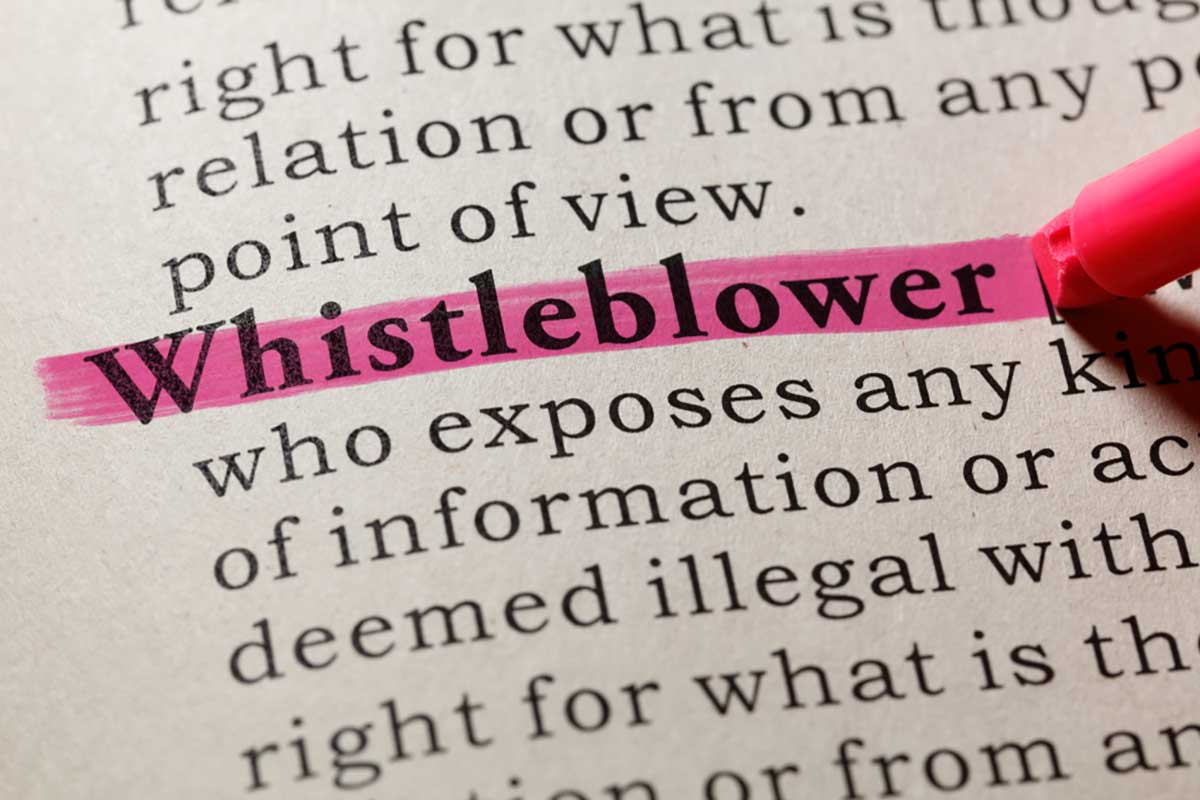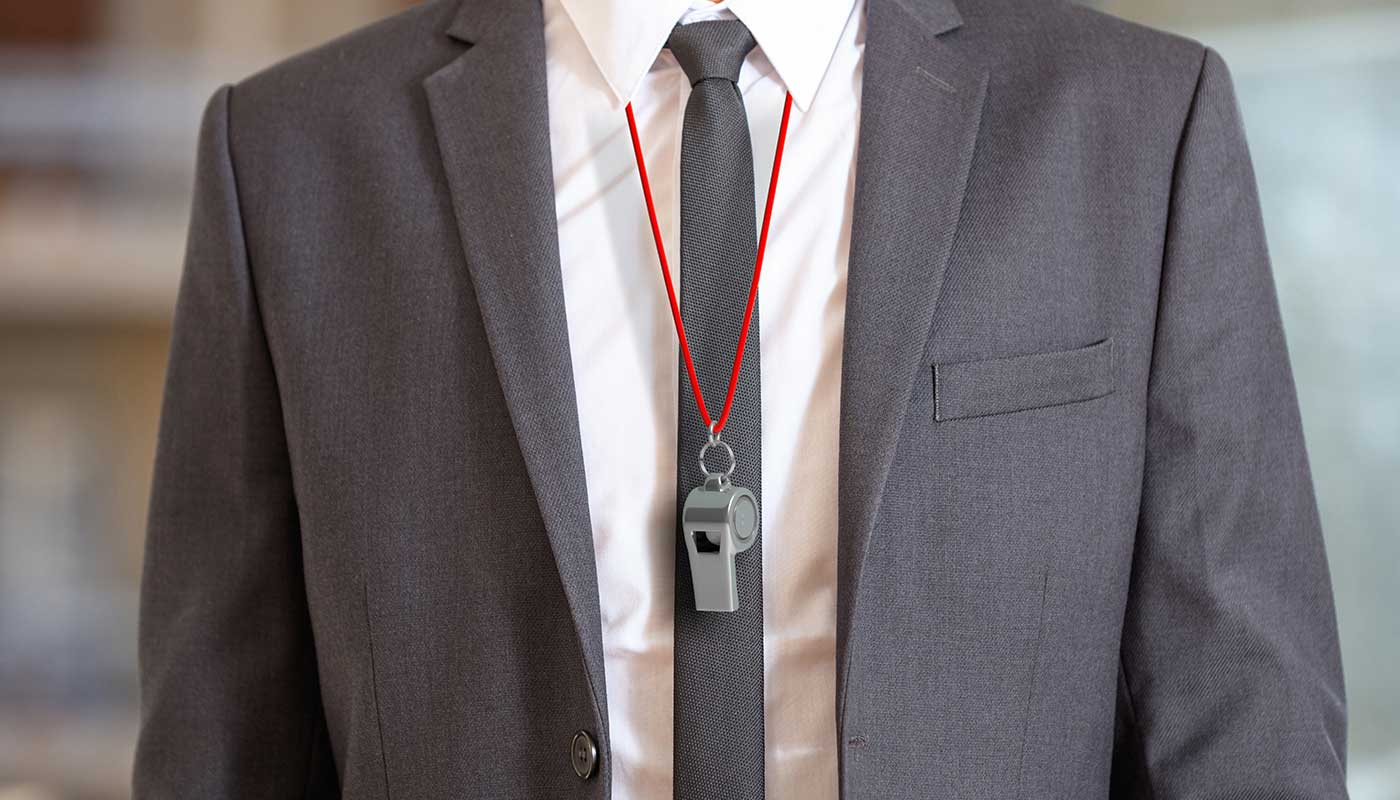Organisations across Europe have either already put in place whistleblowing reporting channels or are developing their strategy for accepting and investigating reports of misconduct and wrongdoing. They are not only carrying out this task to meet the regulatory requirements of the EU Whistleblowing Directive but also because of the many undeniable benefits of whistleblowing.
From improving morale and rooting out fraud to improving the ESG ratings of listed companies and instilling trust in the business, whistleblowing serves many purposes for the corporate world. This is why jurisdictions around the world are keen to nurture and protect whistleblowers, and businesses are increasingly embracing them, too.
To quote Lajos Antal, Head of Deloitte Central Europe’s Cybersecurity Services business line:
“Even the best managers can only make the right decisions if they have access to the right information at the right time – problems, situations, successes and failures alike.”
A major source of that information? Whistleblowers.
1. Whistleblowing in the EU legislation context
1.1 Background
The EU Whistleblowing Directive was an aftermath of a series of major cases brought about by whistleblowers where the reporting person was either punished for making their report or had to remain anonymous for their own safety. The European Union stated that, at the time of the directive’s introduction:
“Whistleblower protection currently provided in the Union is fragmented across Member States and uneven across policy areas. The consequences of breaches of Union law with a cross-border dimension reported by whistleblowers illustrate how insufficient protection in one Member State negatively impacts the functioning of Union policies not only in that Member State, but also in other Member States and in the Union as a whole.”
In addition to that:
“potential whistleblowers are often discouraged from reporting their concerns or suspicions for fear of retaliation. In this context, the importance of providing balanced and effective whistleblower protection is increasingly acknowledged at both Union and international level.”
1.2 Requirements
The directive required businesses, government organisations of more than 250 employees and municipalities serving 10,000 people to implement internal reporting channels by December 2021 and businesses and government organisations with between 50 and 249 staff to have their internal reporting system in place by 17th December 2023.
The law requires that businesses should encourage internal reports of wrongdoing in the first place. This only refers to breaches of EU law in the directive, but some countries have transposed it in a manner that also allows reporting contraventions of national law.
1.3 Types of reporting systems
You can provide written or oral reporting channels for whistleblowers to use. They include post boxes, telephone hotlines, dedicated email addresses and online channels.
IntegrityLog is whistleblower software that reporting persons can use remotely from any device, inputting their allegations and any evidence that they have. The report is confidential and, if the company and the national law allows, can be made anonymously too.
The report alerts the investigation team, who acknowledge the report within a week and follow up on their investigation within three months. The IntegrityLog dashboard helps them keep track of forthcoming deadlines to ensure compliance with the directive.
1.4 Investigation and follow-up
Companies should acknowledge receipt of reports within seven days and have an impartial, competent individual or department follow up with the whistleblower within three months. They must keep the case confidential and provide access to external reporting options if the whistleblower is not satisfied with the outcome.
The company must also protect the reporting person from retaliation taken by parties aggrieved at the report being made.
2. How can whistleblowing be beneficial to the organisation?
2.1 Helps battle fraud
When fraud flourishes within an organisation, it can be damaging. Some businesses can struggle to recover from the financial and reputational effects it leaves in its wake. By encouraging whistleblowing, you can find out about it happening before it gets out of hand and stop it in its tracks. This can help you maintain good relationships with suppliers and clients and limit any fallout.
In the recent case of a German pharmacy, for example, the owner was diluting doses of cancer medicine and reclassifying expired drugs. It transpired that he had committed fraud in at least 60,000 cases, leading to him overcharging health insurance companies by €17 million. In addition, he endangered the lives of patients, with more than 4,000 said to have experienced harm.
Two whistleblowers were too afraid to report the incident internally, so they spent time gathering evidence to report externally. Had the culture at the pharmacy welcomed whistleblowing, the case could have been resolved much earlier.
2.2 Reduces corruption
It is difficult to gauge the exact scale of corruption within the European Union. Reports vary and set the cost of corruption to the GDP of the union per year to anywhere between €179 billion and €950 billion.
The perception certainly remains that it is a problem, with one study finding 68% of EU citizens believe that corruption is rife in their country. Furthermore, only 31% believe that their national government’s efforts to combat corruption are effective. And this is despite countries like Sweden, France and the Netherlands putting in place tougher sanctions for those found guilty of acts relating to corruption.
Whistleblowers are the first line of defence against such misconduct and can uncover corruption or attempted corruption before it becomes ingrained in the way the organisation runs.
2.3 Reduces the risk of legal prosecution
Where individuals and businesses seek to undertake criminal behaviour, there is the chance of legal proceedings occurring. In particular, directors can be held liable for offences carried out by the organisation if they “consented or connived in an illegal activity, or caused it through neglect of their duties”.
Having a whistleblower alert the company to wrongdoing early can therefore reduce the risk that individuals or the legal entity will be subject to criminal or legal proceedings as a result of the activity.
In the case of a German car company, the CEO was charged with fraud and conspiracy after it emerged that the company had purposefully fixed the results of emissions tests in order to seem like they met regulatory requirements, even though they did not. This might have been avoided with an early warning from a whistleblower.
2.4 Reduces the risk of reputational damage
A good reputation is essential to a business. It can make the difference between winning and losing contracts, gaining and losing investors and affect whether customers want to buy from the company.
Whistleblowing allows leadership teams to understand issues within the business that could cause a scandal if revealed to external parties and to put a stop to them in good time. This way, the company gets ahead of the story and takes control of the narrative, showing the business is proactively dealing with wrongdoing rather than looking like it had no handle on internal misconduct or, worse, colluded in that misconduct.
A French care home company came under scrutiny over the treatment of its residents only when a journalist exposed failings brought about by the business cutting corners, even though it was in receipt of public funding.
If the company had fostered an effective speak-up culture, it might have been able to address the shortcomings before they became public and caused a sharp drop in the company’s share price.
2.5 Reduces losses
Early detection of misconduct can reduce the impact it has on the organisation financially. You can stop it before it costs you in regulatory fines, downtime and lost business. With a robust whistleblowing strategy, you can plead for mitigation regarding sanctions if there ever is a compliance issue that occurs, stating that you made every effort to avert it.
Business tycoon Warren Buffet once said of whistleblowing channels, ”on occasion, I have learned of important problems at our subsidiaries that I otherwise would have missed. The issues raised are usually not of a type discoverable by audit but relate instead to personnel and business practices. Berkshire would be more valuable today if I had put in a whistleblower line decades ago.”
2.6 Improve ESG rating
Whistleblower software can help with environmental, social and governance (ESG) ratings. By embedding a speak-up culture into your workplace through a whistleblowing system, you show your employees that you value their safety and security. This is a key element of the social aspect of ESG. In addition, it helps you improve compliance and risk management in terms of governance too.
3. How can whistleblowing be beneficial to employees?
| Benefit | Explanation |
| Empowers people | Employees have the ability to take control of situations, knowing that they will be heard and their input will be valued. This is an empowering situation for people to find themselves in. |
| Creates an open culture | An open culture makes it more difficult for criminal activity to fester. Transparency is a positive for the business, as it leads to people acting in a compliant manner by default. |
| Builds trust between the organisation and the staff |
This transparency and onus to speak the truth creates a trusting bond. Employees never feel like they are being kept in the dark, and the company knows they will speak up if they spot misconduct. |
| Increases job satisfaction and morale |
Staff that are trusted and whose input is valued are happier in their jobs. In addition, a workplace which encourages whistleblowing means they are less likely to face criminal activity. This is a direct consequence of a well-developed speak-up culture. |
| Protects whistleblowers from retaliation |
If the prevailing culture is to encourage, value and nurture whistleblowers, it is less likely that there will be retaliation against reporting persons. They are celebrated rather than feared. |
4. Whistleblowing limitations and challenges
One of the main challenges to whistleblowing is a lack of trust in the systems in place for reporting and investigation. If the reporting person doesn’t believe you are serious about diligent follow-up, they might keep the information to themselves or report it publicly, preventing you from being able to deal with it on your terms.
Whistleblowers also need to have confidence in the company’s ability to prevent retaliation. Some may be hesitant to come forward if they feel that their colleagues might try to gain retribution for the report.
5. FAQs
5.1 What is effective whistleblowing?
Having a clear and easy-to-use whistleblowing channel with procedures in place for swift investigation, feedback and corrective measures makes an effective whistleblowing system. It should keep all parties’ identities confidential during this process and meet the requirements of the EU Whistleblowing Directive.
5.2 Why do employees hesitate to blow the whistle?
Some employees hesitate to blow the whistle because they are not sure they will be taken seriously. Others fear retribution from those affected by the report.
5.3 How do you promote a whistleblowing culture?
Commit to training employees on the importance of whistleblowing, as well as on the procedures for doing so. Ensure they understand that you encourage reporting and value compliance. Make it easy to submit whistleblowing reports and maintain contact with reporting persons to keep them informed of the progress of their report.
5.4 Who can be a whistleblower?
Anyone who has knowledge of unethical or illegal activities within an organisation can be a whistleblower. They must believe their report to be the truth.
5.5 What activities can be reported as whistleblowing?
The EU Whistleblowing Directive’s scope only covers breaches of union law, but some countries have included breaches of national law in their iteration of the directive. Organisations can broaden the scope further if they wish, as long as they include the directive’s minimum requirements within their national law.
5.6 How does whistleblowing help improve organisational reputation?
By demonstrating a commitment to ethics and integrity, organisations can enhance public trust and confidence, attract more talented and ethical employees and improve their overall reputation.
6. Conclusion
There is a wide range of benefits of whistleblowing that your company can embed in its compliance culture. From preventing acts of wrongdoing from happening to mitigating fines in those occasions when misconduct does occur, having a clear and easy-to-use whistleblowing reporting system is essential for businesses.
IntegrityLog is whistleblowing software that provides confidentiality and security to allow you to comply with GDPR data handling legislation as well as the EU Whistleblowing Directive. It is available on any device, making it easy to access for reporting persons and compliance officers alike. The dashboard keeps your investigating team on track with their deadlines. Request a demo today or request a 14-day free trial to find out how to streamline your whistleblowing procedures.
7. References and Further Reading
Share this post
Article Summary
- 1. Whistleblowing in the EU legislation context
- 1.1 Background
- 1.2 Requirements
- 1.3 Types of reporting systems
- 1.4 Investigation and follow-up
- 2. How can whistleblowing be beneficial to the organisation?
- 2.1 Helps battle fraud
- 2.2 Reduces corruption
- 2.3 Reduces the risk of legal prosecution
- 2.4 Reduces the risk of reputational damage
- 2.5 Reduces losses
- 2.6 Improve ESG rating
- 3. How can whistleblowing be beneficial to employees?
- 4. Whistleblowing limitations and challenges
- 5. FAQs
- 5.1 What is effective whistleblowing?
- 5.2 Why do employees hesitate to blow the whistle?
- 5.3 How do you promote a whistleblowing culture?
- 5.4 Who can be a whistleblower?
- 5.5 What activities can be reported as whistleblowing?
- 5.6 How does whistleblowing help improve organisational reputation?
- 6. Conclusion
- 7. References and Further Reading





